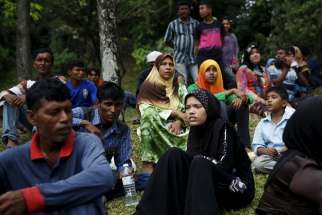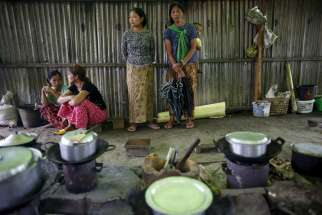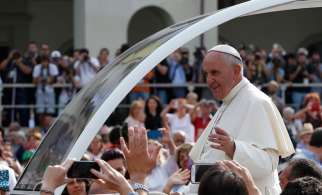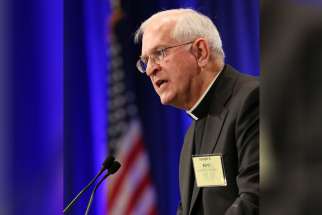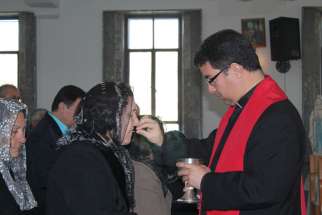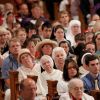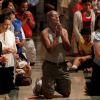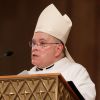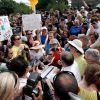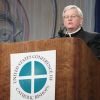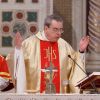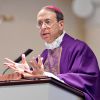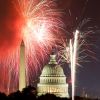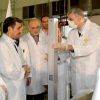WASHINGTON - Exploitation and discrimination abound among refugees from Myanmar's ethnic minority communities who have landed in Malaysia, a five-member contingent from the U.S. Conference of Catholic Bishops learned.
WASHINGTON - Displaced members of Myanmar's Kachin ethnic minority are struggling with being away from their homes and the limited services available in a Catholic-run camp near the Myanmar-China border, said the chairman of the U.S. bishops' Committee on Migration.
Where you can see Pope Francis in the U.S. in September
On June 30, the Vatican released details of Pope Francis’ itinerary for his Sept. 22-27 visit to the United States, his first to this country.
WASHINGTON - The U.S. Catholic Church spent a total of $150.7 million on child protection efforts and to address allegations of clergy sexual abuse of minors in dioceses and religious orders between July 2013 and June 2014.
U.S. bishops' group travels to Iraq, meets with those who fled ISIS
AINKAWA, Iraq - One of Iraq's Christians chased out of her historic homeland quietly prayed the rosary as a bishop who traveled halfway around the world to meet her and others displaced celebrated Mass for them.
America’s most cherished liberty under attack
On the Fourth of July, the Catholic Church in the United States turned toward Washington, not for the fireworks, nor for a windy speech from the president, but for the conclusion of what the American bishops declared to be a Fortnight for Freedom.
I followed it rather more closely than most, since I was appointed last year a consultant to the American bishops Ad Hoc Committee for Religious Liberty. Alarmed at encroachments on religious liberty at home, and escalating violence against Christians abroad, the ad hoc committee of senior bishops proposed a special fortnight of prayer, fasting, catechesis and public action in defense of religious liberty. Summoning forth “all the energies the Catholic community can muster,” the fortnight was a dramatic appeal to Americans — both Catholic and otherwise — to realize that their “first, most cherished liberty” is under sustained and serious attack.
WASHINGTON - When the U.S. Conference of Catholic Bishops asked Catholics to dedicate 14 days to the preservation of religious freedom through prayer, education and public action, they listened.
Catholics in dioceses across the United States participated in Masses, devotions, holy hours, educational presentations and rallies during the June 21 to July 4 campaign to support the nation's "first and most cherished freedom" and draw attention to actions Catholic and other religious leaders say are weakening religious liberty, including the federal contraceptive mandate.
WASHINGTON - Defending religious liberty is part of the bigger struggle to "convert our own hearts" and "live for God completely," Philadelphia Archbishop Charles J. Chaput said July 4 in Washington at the Basilica of the National Shrine of the Immaculate Conception.
He delivered the homily at the Mass that brought the U.S. bishops' "fortnight for freedom" to a close.
"The political and legal effort to defend religious liberty -- as vital as it is -- belongs to a much greater struggle to master and convert our own hearts, and to live for God completely, without alibis or self-delusion," the archbishop said.
WASHINGTON - The U.S. Supreme Court's June 28 decision upholding the health reform law makes it even more urgent for Congress to act to fix the law's "fundamental flaws" on abortion funding, conscience protection and immigrants' access to health care, the U.S. bishops said.
The court found that although the individual mandate in the 2010 health reform law does not pass constitutional muster under the Commerce Clause of the Constitution, it can be upheld as an acceptable exercise of Congress' taxing powers.
WASHINGTON - Federal funding for foreign poverty-focused development and humanitarian aid programs must be preserved as Congress continues debating the fiscal year 2013 budget, said officials from two church agencies.
In particular, officials from the U.S. Conference of Catholic Bishops and Catholic Relief Services called for support of the President's Emergency Plan for AIDS Relief, or PEPFAR, because of high levels of success in the prevention and treatment of AIDS around the world under the program.
ATLANTA - The Year of Faith set to begin in October will give Catholics the chance to experience a "conversion" by turning back to Jesus and entering into a deeper relationship with him, the chairman of the U.S. bishops' Committee on Evangelization and Catechesis said June 13.
Bishop David L. Ricken of Green Bay, Wis., told the spring meeting of the U.S. Conference of Catholic Bishops that the 2012-13 observance stems from Pope Benedict XVI's call for a new evangelization and will incorporate television, radio, social media and numerous online resources to better connect -- or reconnect -- Catholics with their faith.
ROME - Celebrating Mass in Pope Benedict XVI's cathedral, Rome's Basilica of St. John Lateran, a group of U.S. bishops prayed for the Pope and reflected on what they need to do to respond to his call for a new evangelization.
Bishop Michael J. Sheridan of Colorado Springs was the homilist and principal celebrant of an evening Mass May 3 during the "ad limina" visit of bishops from Colorado, Arizona, New Mexico and Wyoming.
On the eve of the bishops' meeting with Pope Benedict, Bishop Sheridan led his fellow bishops in a reflection on the Pope's insistence that strengthening the faith of Catholics, reviving the faith of those who have fallen away and sharing the Gospel with others means they must preach that Jesus is the son of God and continues to live in the church and the Eucharist.
WASHINGTON - The U.S. Conference of Catholic Bishops has appealed a federal judge's ruling that the Constitution forbids religious accommodation in the delivery of services under a federal contract.
The appeal challenges the decision of District Court Judge Richard Stearns, who said in a March 23 ruling that the Department of Health and Human Services violated the Establishment Clause of the Constitution in delegating to the bishops' conference the decision on which services to offer or not offer to foreign-born victims of human trafficking under a federal contract.
Fight for religious freedom
The right of religious freedom means much more than merely being allowed to hold faith beliefs and go to church. Those are essential, of course, but a society that truly endorses religious freedom goes further. It also allows citizens to outwardly live their faith through the public activities they take up and, equally important, through those their conscience informs them to avoid.
In defence of that traditional understanding of religious freedom, the U.S. Conference of Catholic Bishops issued a bold statement four days after Easter. Titled “Our first, most cherished liberty,” the 12-page document is a manifesto for religious freedom that is blunt, provocative, timely, commendable — and worthy of export beyond American borders. Canadians should take note.
WASHINGTON - While Iran's secret nuclear program has raised serious questions about that country's intentions, a military attack on Iranian nuclear facilities would not be justified under Catholic teaching in the eyes of the U.S. bishops and other Catholic leaders.
Further, any attack on Iran by Israel or the U.S. would greatly destabilize an already volatile Middle East, setting the stage for retaliatory military strikes that would place innocent civilians at risk and serve little more than to lead to an expanded arms race in the region, several Catholic observers told Catholic News Service.
The concern lies in what is seen as a preventive attack meant to stop Iran from furthering its nuclear program, which Iranian officials claim is for peaceful purposes.
Such a preventive attack -- as opposed to a pre-emptive strike meant to head off an imminent attack under just-war principles -- also poses moral questions because Iran's research is legal under international agreements and to date falls within the limits set by the Non-Proliferation Treaty regarding the development of nuclear weapons, the Catholic observers said.
"The problem with preventive war is that it lowers the barrier to war too low," explained Stephen Colecchi, director of the bishops' Office of International Justice and Peace.
"Using military action for a vague and gathering threat is very different than using military force in the face of an immediate threat," he said.
In February, reports surfaced that Israel was nearing a military attack on Iran in an effort to knock out some of Iran's key research and military facilities. While the rhetoric has quieted in recent weeks, reports continue to surface that the government of Israeli Prime Minister Benjamin Netanyahu considers an attack necessary.
President Barack Obama reportedly has worked to deter any such strike in the hope that economic sanctions and world pressure might force Iran to scale back its nuclear program, become more transparent about its intentions and allow wider access to International Atomic Energy Agency inspectors.
Acknowledging the tensions in a March 2 letter to Secretary of State Hillary Clinton on behalf of the bishops, Bishop Richard E. Pates of Des Moines, Iowa, cautioned against any military action.
"Discussing or promoting military options at this time is unwise and may be counterproductive," wrote Bishop Pates, who chairs the bishops' Committee on International Justice and Peace. "Actual or threatened military strikes are likely to strengthen the regime in power in Iran and would further marginalize those in Iran who want to abide by international norms."
What observers such as Gerard Powers of the University of Notre Dame, theologian Franciscan Father Kenneth Himes and longtime peace advocate Marie Dennis propose is a measured approach that relies on diplomacy on the road to a solution.
They point to the 2003 preventive attack on Iraq by the U.S. and its allies based on what today is widely considered erroneous information that Iraqi dictator Saddam Hussein had harbored an arsenal of weapons of mass destruction. No weapons were ever found in Iraq and the end result is that after more than eight years of occupation the country remains highly unstable with various religious and political factions maneuvering for power and control.
"If you go down that road it blurs that fundamental distinction between legitimate defense and aggression," said Powers, director of policy of studies at Notre Dame's Joan B. Kroc Institute for International Peace Studies. "It would make a turbulent and unstable Middle East even more so.
"It would be inconsistent with moral certainty that is required before you use military force because it is often speculative about what might happen in the future. In the end it is an endorsement of a notion that might makes right," Powers said.
Father Himes, associate professor of theological ethics at Boston College, agreed with the U.S. bishops' that any attack on Iran under current circumstances constitutes a lowering of the threshold for war.
"Given the state of the devastation of war, we should be raising the bar for going to war," he told CNS.
He also sees Iran possibly acting through its proxies -- Hamas in the Gaza Strip and Hezbollah in Lebanon -- in mounting attacks on civilian targets in southern and northern Israel, respectively.
Father Himes said he would welcome direct negotiations between American and Iranian delegations. Doing so would give Iran a level of respect it seeks in the international community, he said.
Despite the secrecy surrounding Iran's nuclear program, Dennis, co-president of Pax Christi International, said she is concerned that any attack will hasten the expansion of an arms race in the region. Some countries likely seek nuclear weapons contrary to the Non-Proliferation Treaty.
She called for the U.S. lead the effort to make the Middle East a nuclear weapons-free zone.
"Pax Christi feels very strongly that the danger of Israel will be exacerbated by preventive war on Iran," she said. "The best way to provide for security for Israel, which it has a right to expect like Iran, is by eliminating the possession of nuclear weapons so that we ratchet down this kind of threat and that we work for greater regional and global understanding."
The church also can play a role to reducing the threat in the region.
"We can -- the U.S. church and Catholic churches in other nuclear weapons possessing states -- take the lead and be really serious about the consequences of continuing reliance on nuclear weapons," Dennis said. "We've never moved as a church to a place where we as a pastoral imperative challenged the engagement of Catholic people in nuclear weapons production and the strategies of using nuclear weapons.
"We could help move with other Christian and other religious traditions to be clearer about what does it mean in terms of moral decision-making for individuals, for companies and for our government if having nuclear weapons is considered a grave sin," she said.


